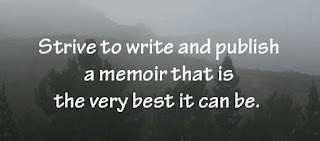So you’ve decided to write your memoir—but you hear nagging
little whispers.
“Who do you think you are?”
“You? Write a book? What makes you so special?”
You might ask, “Who am I, that I should write such stories?
I’m not a Moses, or a David, or a Paul, or an Abraham….”
But wait! Moses got so mad he killed an Egyptian and ran
away and hid in the desert for 40 years.
And later, when God said He was sending Moses to Pharoah to
bring the Israelites out of Egypt, Moses made all kinds of excuses and balked and wailed,
“O Lord, please send someone else to do it” (Exodus 4:13).
Here’s the important point: It’s not that Moses was so
great—it’s what God did: He enabled Moses to lead the Israelites out of Egypt
and into the land of milk and honey—and so much more.
Then there’s David, and Paul. It’s easy to think of them as
saints, but they really messed up sometimes. Their lives were a mixture of
faith and willful disobedience, spiritual success and failures, yet God used
them in mighty ways and continues to do so today. It’s not so much what David
or Paul did, but what God did.
“Abraham is…one of the most important men in the history of
the world,” writes Richard Peace. “What makes him so important … is not his
sterling character (which he did not have), his outstanding intellect (which
may have existed but it is not mentioned), his charming personality (he could
be pretty annoying) or substantial personal accomplishments (he has few,
apart from his pilgrimage to the promised land). What Abraham is remembered for
is his faithfulness in obeying God’s call to undertake a long and demanding
journey. It was not so much what Abraham did, but what God did…. In Abraham we
see not so much a saint in action; rather, the faithfulness and graciousness of
God…. In Abraham we see an ordinary man who is used by God, not because of who
Abraham was, but because of who God is….” (Richard Peace, Spiritual Storytelling)
So…. How does that make you feel? Can you see yourself as an
ordinary person used by God?
Bottom line: Write your stories—not because of who you are,
but because of who God is.
It’s not that we think
we can do anything of lasting value by ourselves.
Our only power and success come from God.
2 Corinthians 3:5, NLT
…Our adequacy is from God…. Therefore, having such a hope,
we use great boldness in our speech [and writing]….
2 Corinthians 3:5, 12, NAS
Write your stories!
Depend on God to make you adequate for this awesome task.
Use heavenly boldness in your writing.
Your stories can help readers
become all God created them to be.















